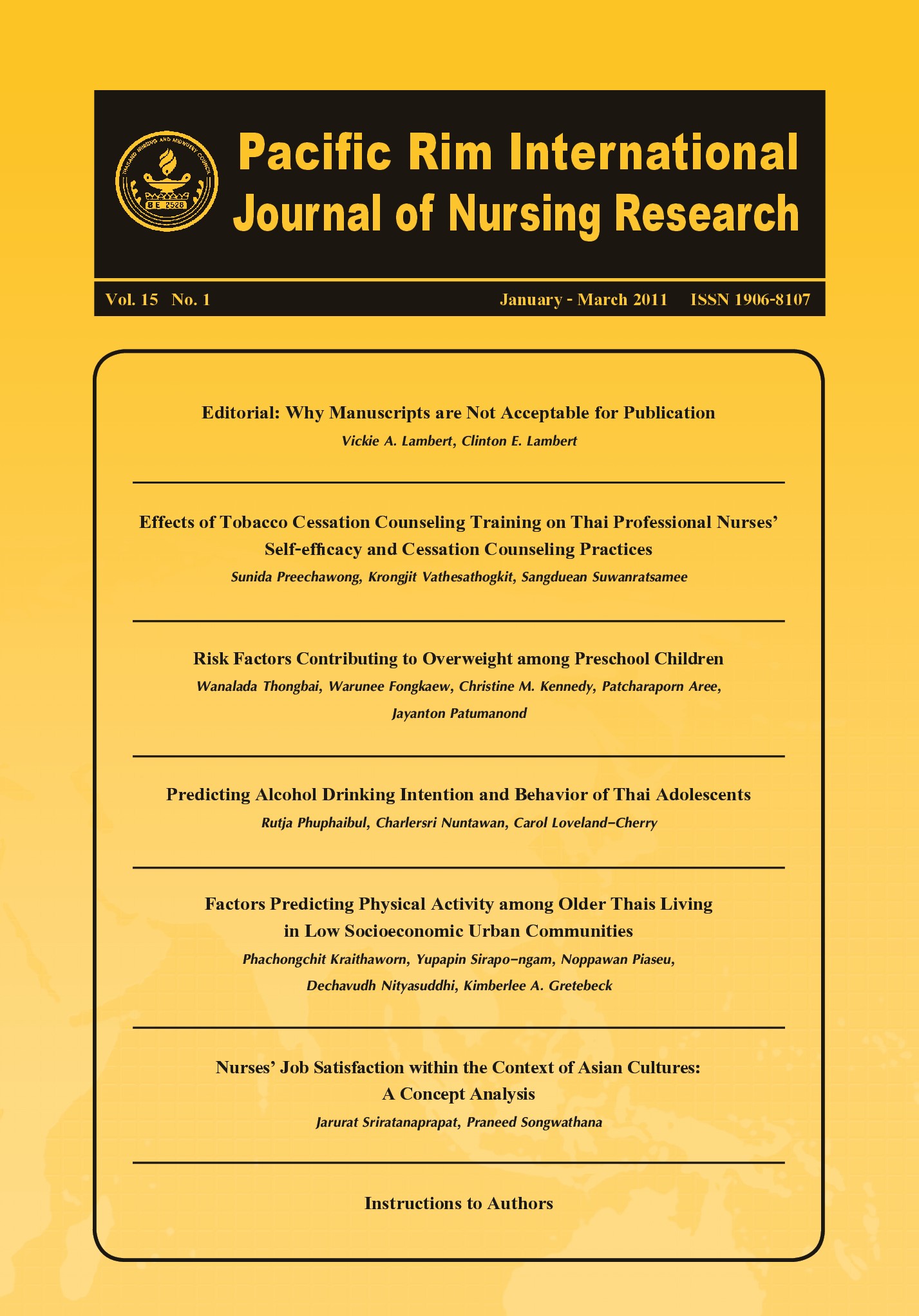Effects of Tobacco Cessation Counseling Training on Thai Professional Nurses’ Self-efficacy and Cessation Counseling Practices
Keywords:
การให้คำปรึกษาในการเลิกสูบบุหรี่, การรับรู้ความสามารถ, พยาบาล, Tobacco cessation counseling, Self-efficacy, NursesAbstract
บทคัดย่อ
การวิจัยกึ่งทดลองแบบกลุ่มเดียว วัดก่อนและหลังการทดลองนี้มีวัตถุประสงค์เพื่อศึกษา ประสิทธิผลของการอบรมการให้คำปรึกษาเพื่อช่วยในการเลิกสูบบุหรี่ที่มีต่อการรับรู้ความสามารถ และการปฏิบัติงานของพยาบาลไทยในการให้คำปรึกษาเพื่อช่วยในการเลิกสูบบุหรี่ กลุ่มตัวอย่างคือ พยาบาลวิชาชีพจำนวน 76 คนที่สุ่มมาจากโรงพยาบาล 3 แห่งในโครงการโรงพยาบาลต้นแบบใน การแก้ไขปัญหาบุหรี่และสุขภาพ ซึ่งริเริ่มโดยมูลนิธิรณรงค์เพื่อการไม่สูบบุหรี่แห่งประเทศไทย กลุ่ม ตัวอย่างใช้เวลา 6 ชั่วโมงในการอบรมเชิงปฏิบัติการที่มีเนื้อหาเกี่ยวกับการให้คำปรึกษาในการเลิก สูบบุหรี่ ซึ่งนำทฤษฏีการรับรู้ความสามารถแห่งตนและข้อแนะนำจากแนวปฏิบัติในการดูแลรักษา ภาวะติดบุหรี่มาประยุกต์ใช้ เก็บรวบรวมข้อมูลการรับรู้ความสามารถแห่งตนในการให้คำปรึกษาเพื่อ การเลิกสูบบุหรี่และการปฏิบัติงานในการให้คำปรึกษาดังกล่าวทำโดยใช้แบบสอบถามชนิดให้ตอบ ด้วยตนเอง ก่อนการอบรมและหลังการอบรม 3 เดือน และ 6 เดือน ผลการวิจัยพบว่าคะแนนเฉลี่ย ของการรับรู้ความสามารถแห่งตนในการให้คำปรึกษาเพื่อการเลิกสูบบุหรี่ก่อนและหลังรับการอบรม 3 เดือนไม่แตกต่างกันมาก แต่มีความแตกต่างอย่างมีนัยสำคัญหลังรับการอบรม 6 เดือน และพบว่า คะแนนเฉลี่ยของการปฏิบัติงานการให้คำปรึกษาเพื่อการเลิกสูบบุหรี่เพิ่มขึ้นอย่างมีนัยสำคัญตาม ระยะเวลา ผลการวิจัยแสดงว่าการอบรมเชิงปฏิบัติการเกี่ยวกับการให้คำปรึกษาเพื่อการเลิกสูบบุหรี่ ที่มีการนำทฤษฏีที่เกี่ยวข้องมาประยุกต์ใช้ทำให้พยาบาลมีความเชื่อมั่นในความสามารถของตนเอง ด้านการให้คำปรึกษาเพื่อการเลิกสูบบุหรี่รวมทั้งปฏิบัติงานที่เกี่ยวข้องกับการช่วยให้เลิกสูบบุหรี่มากขึ้น
คำสำคัญ : การให้คำปรึกษาในการเลิกสูบบุหรี่, การรับรู้ความสามารถ, พยาบาล
Abstract
This one-group, pretest-posttest, quasi-experimental design aimed to examine the effectiveness of tobacco cessation counseling training on Thai nurses’ self-efficacy and tobacco cessation counseling practices. A sample of 76 professional nurses was randomly recruited from three hospitals involved in the smoke-free hospital campaign, initiated by the Action on Smoking and Health Foundation in Thailand. The participants received a six-hour program on tobacco cessation counseling that was based on recommendations from Clinical Practice Guidelines on treating tobacco use and dependence, within the context of Bandura’s self-efficacy theory. Self-efficacy for tobacco cessation counseling and cessation counseling practices were assessed using three self-administered questionnaires prior to receipt of the counseling cessation program, and 3 and 6 months after the program was completed. Data were analyzed with descriptive statistics and repeated measures analysis of variance. The findings showed the mean score of self-efficacy for tobacco cessation counseling was about the same prior to receipt of the counseling program and 3 months after completion of the program, but was significantly higher 6 months after completion of the program. The mean score of cessation counseling practices was found to significantly increase over time. The findings suggested a theory-based training program in tobacco cessation counseling can significantly increase nurses’ confidence and provision of counseling.
Keywords : Tobacco cessation counseling, Self-efficacy, Nurses
Downloads
How to Cite
Issue
Section
License
Copyright: The Pacific Rim International Journal of Nursing Research, Thailand Nursing & Midwifery Council has exclusive rights to publish, reproduce and distribute the manuscript and all contents therein.








.png)



